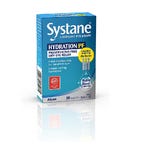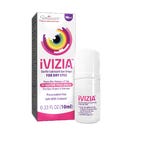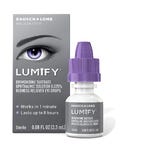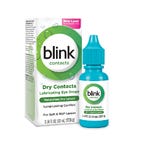Best Over-the-Counter Eye Drops of 2024
We spoke to experts to find the best eye drops for dryness, redness and other eye issues. Here's what to know.
What to consider
Purpose
Ingredients
Preservatives
Our Picks

These are some of the best OTC eye drops, according to experts.
If you deal with dry or red eyes, you may sometimes grab the nearest bottle of eye drops for some much-needed relief. While that can be helpful in some cases, it's important to know that not all over-the-counter drops are created equal. Additionally, the drops you may be using might not be right for your specific needs. Eye drops, also known as artificial tears, are available in a variety of types -- but they're all here to help lubricate the eye. Lipid-based artificial tears, eye drops with preservatives and those without are just a handful of the kinds available. Choosing the correct one all depends on your specific eye health and condition.
Walking into the eye care aisle at your local pharmacy can certainly be overwhelming. The shelves are packed with many eye drops at different prices all serving specific purposes. When in doubt, remember to consult with your eye doctor. We spoke to optometrists and ophthalmologists to choose the best over-the-counter eye drops they recommend to patients based on different needs. Below are their top eye drops for when you're in a pinch.
What are the best eye drops overall?
The iVizia sterile lubricant eye drops are our pick for the best eye drops overall because they're recommended by many professionals and versatile enough for a range of eye issues.
Best eye drops of 2024
The iVizia eye drops are a favorite among ophthalmologists. These artificial tear eye drops are intended for dry eyes, but are multipurpose and can work for just about any eye issues you have.
Dr. Thomas Stokkermans, an optometrist and medical reviewer at All About Vision, said, "These drops have one of my preferred lubricants in it known as Povidone and the high-technology dispenser has a filter in it to prevent contamination, and allows the artificial tears to be preservative free and dispensed from a multiuse container."
According to Dr. Natalya Rooney, optometrist and owner of Merrick Avenue Optometry, another great aspect of these drops is their versatility and efficiency. "These drops can also be used with contact lenses and the size of the drop is smaller than other artificial tears which makes it easy to not waste drops," she said.
Best eye drops for dry eyes
Systane Complete PF Eye Drops
Systane is a trusted brand recommended by optometrists for those with dry eyes. As someone who's struggled with dry eyes, this product is also my usual go-to. The Systane eye drops work for up to eight hours and are ideal for dry, sensitive eyes. The bottle is designed to dispense nano droplets so you don't waste any product. They're also safe enough to use regularly since they're free of preservatives and can reduce risk potential for toxicity.
Dr. Cecelia Koetting, optometrist and clinical instructor at the University of Colorado School of Medicine, said she likes these drops for all kinds of dry eyes, and they're also safe to use during pregnancy, which can bring on a case of dryness.
Best eye drops for red eyes
Lumify
It's important to know the cause of red eyes before self-medicating. Koetting said that "if someone has red eyes it is typically a symptom of something else, such as more severe dry eye disease and is a good idea to see an eye care professional, especially if there is any sudden pain with it."
Dr. John Sheppard, an ophthalmologist and Professor of Ophthalmology at Eastern Virginia Medical School agrees and advises avoiding vasoconstrictor eye drops with naphazoline, a decongestant that is usually found in OTC eye drops like Visine or Clear Eyes. This ingredient is also known to restrict blood flow which can cause high blood pressure.
"These types of drops induce dependency, so I prefer Lumify," said Dr. Sheppard. If you've cleared with your doctor that it's appropriate to use OTC drops for redness, Lumify is a solid choice. Lumify contains brimonidine, which is commonly used in glaucoma medication. It also helps reduce pressure and fluid in the eyes. As long as you aren't dealing with an infection or other medical complication, it is safe to use, especially if you're looking to reduce eye redness fast.
Best eye drops for contact lens users
Blink Eye Drops for Contact Lenses
If you wear contact lenses then you're probably used to having dry eyes when you wear them for too long. That's why it's important to rewet them throughout the day. Blink eye drops are popular lubricating eye drops for contact lens users. These drops can be used before inserting your contacts or after the fact. Blink contacts aren't preservative-free and include an ingredient known as OcuPure which is a gentle oxidative preservative made up of sodium chloride and other ingredients that transform into natural tear components in the eye.
This is one of Dr. Stokkermans' top eye drop picks. "I like Blink Contacts because it has a good preservative [OcuPure] that does not cause as much eye problems," he said. If you're not sure if Blink Eye Drops are right for your contact needs, consult with your eye doctor first.
Best eye drops for post eye surgery dryness
Systane Hydration PF Eye Drops
One of the post-surgery side effects of LASIK or cataract eye surgery is dry eyes. A safe eye drop choice that will help relieve dryness caused by eye surgery is Systane's Hydration PFeye drops.
I personally like the single vials Systane offers: They're easy to toss in your bag when you're on the go and they're less wasteful. Systane's Hydration PF eye drops differ from our other top pick, Systane Complete PF eye drops, because the former is more for those who need to regularly hydrate their eyes during recovery.
These hydration drops are Koetting's top pick for patients who've had LASIK eye surgery because they provide long-lasting relief and have the extra moisturizing hydration components that are needed.
Best eye drops for allergies
Pataday Once Daily Relief Allergy Eye Drops
Allergy sufferers know that allergy season can wreak havoc on your eyes. That's why having dependable eye drops on hand can be helpful. Pataday Once Daily Relief Allergy Eye Drops are recommended by physicians because they contain an antihistamine that offers fast symptom relief for mild to moderate allergies. They can tackle indoor and outdoor allergens like dander, pollen, ragweed and grass. If you use contact lenses, it's advised to not use these drops while wearing them and if you do, you should wait 10 minutes after application before inserting them.
"Pataday extra strength is a pretty effective drop and all you need to do is apply it once daily to each eye," Dr. Rooney said. If you're uncertain if Pataday will work for your allergy condition, remember to consult with your doctor in case you are a better candidate for a medicated option.
Best overnight eye drops
Optase Hylo Night Dry Eye Ointment
Sometimes you will need overnight drops if you need extra lubrication in your eyes. Overnight drops are different from your standard eye drops. "Oftentimes a thicker gel or ointment may be recommended for overnight 8-hour relief while sleeping," said Dr. Nathan Lighthizer, an optometrist and associate dean at the Northeastern State University Oklahoma College of Optometry.
The Optase Hylo Night Dry Eye Ointment is a favorite of Koetting, who recommends this preservative-free drop to patients with certain sleeping conditions. "For those who have a CPAP machine or may sleep with eyes partially open, this ointment in particular is good because it has Vitamin A to help heal the front surface," she said.
Optase is safe for everyday use and is applied to the eyelids before bed. People with moderate to severe dry eyes may find relief using this ointment regularly. If your eyes don't seem to improve after some time, speak with your doctor to find a better or stronger solution.
How we evaluated the best eye drops
We consulted with six ophthalmologists and optometrists who prescribe eye drops to patients regularly and are familiar with the many over-the-counter eye drop brands on the market. We compiled their expertise and recommendations, which were based on ingredients, safety, ease of use, versatility and other factors.
What to consider when choosing eye drops
Before buying any type of eye drops, it's important to speak with your doctor so they can evaluate your issue. In some cases, OTC eye drops are sufficient, but in other situations, you may need prescription medicated drops.
If your issue can be resolved with OTC eye drops, you should know that there are drops with preservatives and others without them. The preservative-free eye drops are generally safe for most people -- including pregnant people. Drops with preservatives should be used more conservatively because they can worsen some cases. The same is true for other drops, such as the ones for redness relief.
"Poor-quality artificial tears, or ones that tout the red out, often have chemicals that can cause problems including rebound redness, dilation of the eyes, corneal toxicity, blurred vision and worsening of dry eye disease," Koetting warned.
Dr. Edmund Farris, an associate clinical professor of ophthalmology at Mount Sinai, added that these preservatives have the ability to change aspects of the eye. He said, "the preservatives in most drops can alter the corneal surface and cause loss of these superficial corneal cells, which may eventually lead to more symptoms." So if you're using these types of drops too often, this can become an issue.
Some signs to look out for if you think you're having a negative reaction to eye drops include redness that gets worse, irritation, blurred vision and a burning or grittiness sensation. Oftentimes this occurs due to the preservatives found in some drops. Koetting said that if these symptoms don't improve, it can indicate an allergy or sensitivity to the drops. "However, if a person notices that they are having an increase in itching, swelling around the eye or the whites of the eyes become swollen and red, they should immediately discontinue the drop and call an eye care professional," she added.
When eye drops aren't enough
In some cases, you may need steroids or other medicated treatments if OTC eye drops are not doing their job.
"Oftentimes, dry eye disease has multiple causes, and will take multiple treatments to see improvement," Dr. Lighthizer said. He added that a patient with mild to severe dry eye may require multiple treatments, including OTC artificial tears (usually preservative-free) along with a prescription dry eye drop.
According to Koetting, a good rule of thumb to follow is if the symptoms have minimal improvement over two weeks or if you find yourself using over-the-counter artificial tears more than twice a day. "We know that dry eye disease is a chronic problem that can flare depending on the season and the patient will likely need to be evaluated for appropriate care and then monitored," she said.







